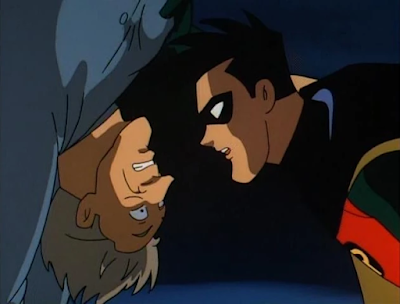My views on Robin as a character have been cited here before, so I won't go into great detail on them again. Needless to say, I am not a fan. Even if you could argue that he doesn't detract from the overall atmosphere of the stories (and I don't think you can), you'd be even more hard-pressed to argue that he brings anything positive, either. In Robin's Reckoning, part I, as the producers were giving credit to their audience by not dwelling on The Batman's origin story once again, it's fair to say that Robin's origin story is a little more obscure, especially with their having been three versions of the character by the time this aired, so you can understand why an episode (or two) would be committed to telling the story of the (sigh) Boy Wonder. They decided to proceed with the original, Bob Kane story, which was him being the scion of the Flying Graysons, a circus act that goes awry after contact with the local mob. It's the corniest of Robin origins, but may be the most appropriate. Where else but the circus would a kid his age develop the skills needed to swing around Gotham's rooftops with its hero? Besides, I always had a soft spot in my weird fiction attachment for strange carnies and the setting of the traveling circus, rolling from one backwater town to the next with the bizarre in its wake. That is the kind of aura that permeates The Batman's rogues' gallery, anyway, even if it doesn't describe the clean and family-friendly circus that is the locus of the Graysons' act.
But this episode begins with the grown, almost-adult Robin and his fairly extreme differences of opinion with his mentor on technique and responsibility. Unfortunately, it also emphasizes the youthful exuberance that doesn't seem to extend to recklessness but does make him seem goofy which is, of course, not The Batman at all. There's a sharp contrast there with an example of our hero's ruthless edge, as they let a gangster ("A contract saboteur, Robin.") hang from a girder 30 stories up, despite his complaints ("The cops wouldn't leave me!" "We're not the police...") When The Batman attempts to protect his sidekick from his own past, the latter reacts with justifiable outrage ("Stone cold, self-righteous-!") When we get into the actual origin story, I questioned at first why the writer and director felt it appropriate to show Robin's continual rage at being left behind, while it wasn't so to show the young Dick Grayson coming to grief over his parents' death, especially in his room at Wayne Manor when he pulls their picture from his suitcase. Was the idea that he was already hardening to be like his eventual mentor? Or perhaps that young boys watching the show would think that he was weak and not appreciate him the way writers of the comics (including Kane) and the show had always intended? ("Kids can relate to him!" No. No, they really can't.) Anger is OK to display but grief isn't? This is already a problem with our society. But, then, later they relent and do show tears on his face for about one second when Bruce comes to reassure him, so maybe my concern was misplaced.
They also return to that aura of real menace around The Batman, as he confronts a gangster with that shadowy silhouette and the cracking of his knuckles, confirming what's to follow if he doesn't get his way. He's still propelled by his anger in this situation, many years before, just as the older Robin is in the "present day" of the episode. His confrontation with local crimelord, Stromwell, is really well-paced and brings us back to that heavy noirish atmosphere. (That scene also displays the older costume with the chest-wide black bat, rather than the convenient target of the more modern suit.) There's also an excellent action sequence of dodging multiple bullets from a tommy gun, but seeing the actual effect of said bullets for once, as his cape shows the holes from the near misses as he dives over a barrier. It's those little moments of realism that continue to pay credit to the storytellers involved with the series. And all of this seems to be driven by that darker side of the characters in play. All of it is driven by rage, both The Batman's actions and Robin's reactions in the present day. Indeed, you could speculate that even the brief moment of grief on Dick's behalf is still driven by the anger at the injustice of it all. There's nothing wrong with that and certainly explains why the whole story was split into two episodes, as the implicit understanding is that anger can only drive you so far, whether it's seeking vengeance or getting irritated at being sidelined.
Despite my typical disdain for the character, the writing in this episode is quite solid and grounds our characters in those human emotions that are so essential to effective storytelling. The only complaint at the moment would be that both Robin and young Dick Grayson have the least solid roles in the story that is ostensibly about him/them. Part 2 is next, obvsly.




No comments:
Post a Comment
Note: Only a member of this blog may post a comment.